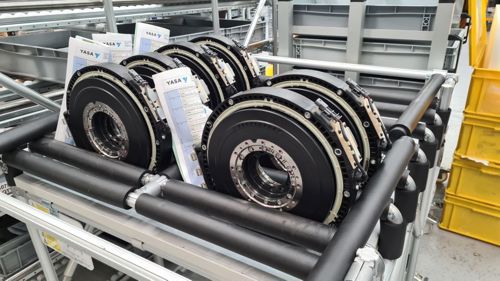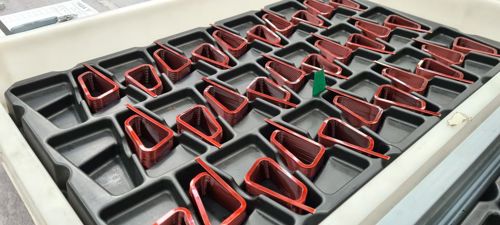
Name: Georgie Molloy
Position at YASA: lead technical specialist - materials
Year in which you joined YASA: 2017
Number of years in current YASA role:
Materials engineer: 2017- 2021
Senior materials engineer: 2021 - 2024
Lead technical specialist – materials: Jan 2024 – present
When did you first decide you wanted to pursue a career in automotive engineering?
I decided to pursue automotive engineering during my placement year at university. I studied design with engineering materials at Loughborough University in the UK. While I was always interested in engineering due in part to my love for maths, science and problem-solving, my passion for the automotive industry was ignited during my placement at YASA in 2015. Before YASA, however, from a younger age my father, who was always tinkering with classic cars and motorcycles, initially sparked my interest in cars. The placement with YASA then solidified my decision to stay in the automotive field, and I have been with YASA ever since.
Can you please give us a brief overview of your career so far to the present day?
My career began with a placement year at YASA in 2015, when the company had only 40 employees. This gave me a chance to learn extensively and get a feel for various aspects of the business, working directly with the founder, Tim Woolmer. After completing my university degree, I returned to YASA as a materials engineer in 2017, focusing on the manufacturing side of our motors, particularly the laser welding of polymer parts. My role involved quality control, process development and collaboration with suppliers and other departments.
In 2021, I was promoted to senior materials engineer, where I delved into new technologies and material testing, exploring innovative manufacturing methods and materials. I worked closely with suppliers, conducted tests and shared results with the broader company to ensure the development of effective technologies.
Since the start of the year, I have been serving as YASA’s lead technical specialist – materials, again working closely within Tim’s research and development team. This role has expanded my responsibilities to include leading projects and overseeing the development of new generation motors and exploring new materials and manufacturing methods.
Nurturing a successful career in automotive engineering isn’t easy. Is that challenge even more heightened and dramatically acute given your gender? If so, what type of challenges have you had to encounter over the years, no matter how ‘small’ (or major!) they might seem, in developing and growing your career in the automotive industry?
I wouldn't say my gender has made my career more challenging. Initially, fresh from university, it was more about proving myself and getting my ideas across, which I believe is a common challenge for anyone new and young in a company.

Do you feel things have improved for women in engineering? If so, what elements and aspects has the industry progressed upon particularly well and in what sort of timeframe have ‘things got better’? If not, would you say things have gone backwards / stood still and, if so, can you please give us a bit more detail on why that’s the case?
Having only worked at YASA, I can't speak for the entire industry. However, I've noticed increased awareness and encouragement around gender diversity in engineering over the years. For instance, I wasn't aware of organizations like the Women’s Engineering Society (WES) when I first started, but now, such resources are more actively promoted both within and outside the company.
What industry-wide issues, concerns and challenges need to be addressed for women in engineering?
Raising awareness from a young age is crucial. Offering work experience opportunities and university placements can help young women realize the potential careers available in engineering. Also, practical experience can help them decide if this is the right path for them.
Is automotive engineering a fair and an unbiased industry to work in?
Based only on my experience at YASA, the industry strives to be fair, although there are still more men than women engineers. YASA makes a conscious effort to ensure fairness and has improved over the years. I feel the key challenge is attracting more women into the field in the first place.
How diverse would you say the UK automotive industry is and how does that compare with 10 years ago and how might that picture look in 2034?
Diversity in the UK automotive industry has improved during my seven years in it, but I feel there’s still much room for growth. I am optimistic that with continued awareness and efforts, the gender gap will narrow, and the industry will become more inclusive by 2034.
What’s life like for you in YASA?
Working at YASA has been incredibly rewarding. I've made lifelong friends and have grown significantly both as an engineer and as a person. While it can get busy, the excitement of working on cutting-edge sustainable technologies and seeing our work come to fruition in state-of-the-art production electric motors is highly fulfilling.

How does the company address the industry-wide challenges relating to women in engineering?
YASA actively promotes diversity within the company and encourages participation in organizations like WES. We've had discussions with HR about the experience of women at YASA, aiming to foster a supportive and inclusive environment.
Please can you talk us through a typical working day for you at YASA
My days vary, but they often include physical testing of parts, material testing, overseeing projects, coordinating with suppliers, updating timelines and test plans and attending meetings with wider engineering and development teams to ensure everything is on track.
What piece of advice would you give to young female engineers just starting out on their career path?
Enjoy it and try to learn as much as possible and don’t be scared to ask to try something new or get involved with other activities you might be interested in. The best way to find out what you do and don’t enjoy is by giving it a go.
What advice would you give to female students having just finished college and are now assessing whether to study some form of engineering / automotive engineering or choose a competing course that’s not engineering related whatsoever?
Choose a path that genuinely interests you. For me, engineering was a natural fit because I enjoyed maths, science and problem-solving. Follow your passions, and you’re more likely to succeed.
What’s the best piece of career advice you ever received?
A colleague once told me to always back up my ideas with data. This advice has been invaluable, as having concrete evidence to support my suggestions has consistently helped me communicate effectively and gain support for my ideas.
What technical or engineering marvel most stands out for you personally?
I am fascinated by space-related engineering feats, such as the Hubble Space Telescope, Mars rovers, James Webb Telescope and the moon landings. These achievements showcase our ability to design and manufacture technology that withstands extreme environments and significantly expands our understanding of the universe. They are truly inspiring.










IET sounds warning on AI doll trend
I agree that we need to reduce cooling water demand for servers. And yes, generative AI consumes a large amount. But what about BitCoins? Their...